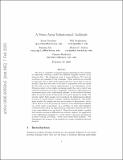A Swiss army infinitesimal jackknife
Author(s)
Jordan, MI; Stephenson, William T.(William Thomas); Broderick, Tamara A
DownloadAccepted version (2.645Mb)
Open Access Policy
Open Access Policy
Creative Commons Attribution-Noncommercial-Share Alike
Terms of use
Metadata
Show full item recordAbstract
The error or variability of machine learning algorithms is often assessed by repeatedly refitting a model with different weighted versions of the observed data. The ubiquitous tools of cross-validation (CV) and the bootstrap are examples of this technique. These methods are powerful in large part due to their model agnosticism but can be slow to run on modern, large data sets due to the need to repeatedly re-fit the model. In this work, we use a linear approximation to the dependence of the fitting procedure on the weights, producing results that can be faster than repeated re-fitting by an order of magnitude. This linear approximation is sometimes known as the “infinitesimal jackknife” in the statistics literature, where it is mostly used as a theoretical tool to prove asymptotic results. We provide explicit finite-sample error bounds for the infinitesimal jackknife in terms of a small number of simple, verifiable assumptions. Our results apply whether the weights and data are stochastic or deterministic, and so can be used as a tool for proving the accuracy of the infinitesimal jackknife on a wide variety of problems. As a corollary, we state mild regularity conditions under which our approximation consistently estimates true leave-k-out cross-validation for any fixed k. These theoretical results, together with modern automatic differentiation software, support the application of the infinitesimal jackknife to a wide variety of practical problems in machine learning, providing a “Swiss Army infinitesimal jackknife.” We demonstrate the accuracy of our methods on a range of simulated and real datasets.
Date issued
2019-04Department
Massachusetts Institute of Technology. Department of Electrical Engineering and Computer ScienceJournal
Proceedings of the 22ndInternational Conference on Ar-tificial Intelligence and Statistics (AISTATS)
Publisher
PMLR
Citation
Giordano, Ryan et al. “A Swiss army infinitesimal jackknife.” Proceedings of the 22nd International Conference on Artificial Intelligence and Statistics (AISTATS), 89 (April 2019): © 2019 The Author(s)
Version: Author's final manuscript
ISSN
1938-7228